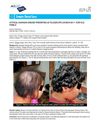 March 2014 in “Journal of The American Academy of Dermatology”
March 2014 in “Journal of The American Academy of Dermatology” Azathioprine treatment led to rapid hair regrowth in a woman with alopecia universalis.
 11 citations,
April 2009 in “Pharmacotherapy”
11 citations,
April 2009 in “Pharmacotherapy” Minoxidil can cause deadly skin reaction; monitor patients closely.
 47 citations,
January 2003 in “American Journal of Clinical Dermatology”
47 citations,
January 2003 in “American Journal of Clinical Dermatology” Mood stabilizers can cause serious skin reactions; careful monitoring and immediate treatment are crucial.
[object Object]  13 citations,
January 2018 in “BioMed Research International”
13 citations,
January 2018 in “BioMed Research International” Scalp involvement is common in pemphigus and can lead to hair loss, with the severity of scalp lesions linked to overall disease severity.
 May 2023 in “Frontiers in veterinary science”
May 2023 in “Frontiers in veterinary science” A young tapir with a rare skin condition improved after treatment with wound cleaning, cream, and oral medication.
 3 citations,
March 2021 in “Clinical, Cosmetic and Investigational Dermatology”
3 citations,
March 2021 in “Clinical, Cosmetic and Investigational Dermatology” Early treatment of Lupus Erythematosus Alopecia can prevent permanent hair loss, and various medications are effective.
 1 citations,
May 2021 in “BMC Proceedings”
1 citations,
May 2021 in “BMC Proceedings” The document concludes that more research is needed to reduce frequent hospital visits, addiction medicine education improves with specific training, early breast cancer surgery findings are emerging, nipple smears are not very accurate, surgery for older melanoma patients doesn't extend life, a genetic condition in infants can often be treated with one drug, doctors are inconsistent with blood clot medication, a certain gene may protect against cell damage, muscle gene overexpression affects many other genes, and some mitochondrial genes are less active in mice with tumors.
 109 citations,
October 2007 in “American Journal of Human Genetics”
109 citations,
October 2007 in “American Journal of Human Genetics” Giving a special protein to dogs with a certain genetic disease improved their symptoms but didn't help with hair growth.
 23 citations,
December 2004 in “Seminars in oncology”
23 citations,
December 2004 in “Seminars in oncology” Liposomal anthracyclines are effective and safer for treating multiple myeloma, especially in elderly patients.
 11 citations,
September 1999 in “Journal of the European Academy of Dermatology and Venereology”
11 citations,
September 1999 in “Journal of the European Academy of Dermatology and Venereology” Immunomodulatory therapies are effective for treating cutaneous lymphoma, particularly in early stages.
 March 2005 in “Journal of The American Academy of Dermatology”
March 2005 in “Journal of The American Academy of Dermatology” Itch is a common symptom in patients with chronic venous insufficiency, often accompanied by burning and pain.
 March 2005 in “Journal of The American Academy of Dermatology”
March 2005 in “Journal of The American Academy of Dermatology” Diphencyprone treatment protocols could be simplified as no harm occurred despite not fully following them.
 9 citations,
March 1968 in “The BMJ”
9 citations,
March 1968 in “The BMJ” A woman's severe skin reaction was caused by an allergy to a skin treatment.
[object Object]  47 citations,
March 2019 in “Journal of immunology research”
47 citations,
March 2019 in “Journal of immunology research” Valproic Acid could potentially be used to treat immune-related conditions due to its ability to modify immune cell functions.
 10 citations,
January 2003 in “Journal der Deutschen Dermatologischen Gesellschaft”
10 citations,
January 2003 in “Journal der Deutschen Dermatologischen Gesellschaft” Hydroxychloroquine helped improve scleromyxoedema in patients, but caused side effects in some.
 3 citations,
May 2018 in “Experimental Dermatology”
3 citations,
May 2018 in “Experimental Dermatology” Young HS patients often have other physical and mental health issues, and research on HS covers a wide range of topics including genetics, triggers, treatments, and the need for more data.
 July 2003 in “British Journal of Dermatology”
July 2003 in “British Journal of Dermatology” Some skin conditions are associated with other serious diseases, and office microscopy may miss many fungal infections.
 1 citations,
March 2011 in “Infertility”
1 citations,
March 2011 in “Infertility” Hormone imbalances from the pituitary, thyroid, and adrenal glands can cause infertility, but treating these disorders can improve fertility.
 December 2016 in “British Journal of Dermatology”
December 2016 in “British Journal of Dermatology” The meeting highlighted the importance of genetic testing and multidisciplinary approaches in pediatric dermatology.
 5 citations,
January 2016 in “Journal of The American Academy of Dermatology”
5 citations,
January 2016 in “Journal of The American Academy of Dermatology” Skin doctors should know about skin and kidney disease links to prevent serious kidney problems.
 16 citations,
September 2020 in “British journal of dermatology/British journal of dermatology, Supplement”
16 citations,
September 2020 in “British journal of dermatology/British journal of dermatology, Supplement” The article suggests that targeting specific immune pathways could help control and treat the skin disease hidradenitis suppurativa.
 June 2023 in “Pharmaceuticals”
June 2023 in “Pharmaceuticals” Men and women respond differently to drugs for COVID-19, high cholesterol, and diabetes, which suggests a need for personalized treatments.
3 citations,
November 2022 in “The Egyptian Rheumatologist” Macrophage activation syndrome can be a deadly first sign of systemic lupus erythematosus.
 January 2023 in “Indian dermatology online journal”
January 2023 in “Indian dermatology online journal” A child with trichothiodystrophy also had autoimmune thyroiditis and anemia, which is a new finding.
 2 citations,
September 2011 in “Pediatric Dermatology”
2 citations,
September 2011 in “Pediatric Dermatology” The document suggests there might be a link between Kawasaki Disease and Alopecia Areata that needs more research.
 35 citations,
May 2008 in “Journal of Clinical Oncology”
35 citations,
May 2008 in “Journal of Clinical Oncology” A cancer patient died from a severe skin reaction after taking the drug cetuximab.
 May 2021 in “Journal of the American College of Cardiology”
May 2021 in “Journal of the American College of Cardiology” An 11-year-old girl with Kawasaki disease experienced hair loss that improved after treatment.
 August 2001 in “Veterinary Dermatology”
August 2001 in “Veterinary Dermatology” The meeting presented findings on effective treatments for various pet skin conditions and insights into the immune responses of dogs with atopic dermatitis.
 19 citations,
June 2001 in “Annals of Internal Medicine”
19 citations,
June 2001 in “Annals of Internal Medicine” Tamoxifen can cause total hair loss but its benefits outweigh this side effect.

Dupilumab helped improve skin and prevent new lesions in a child with a rare immune disorder and severe eczema.





























